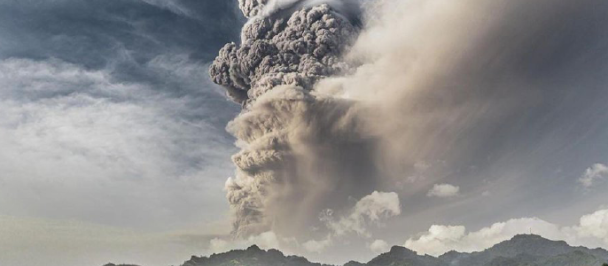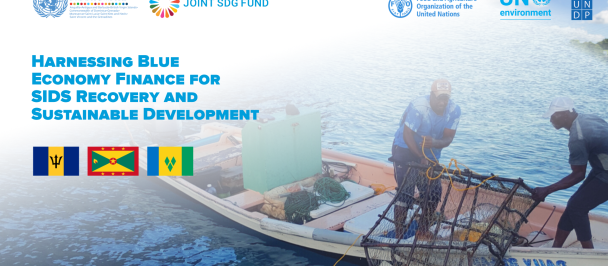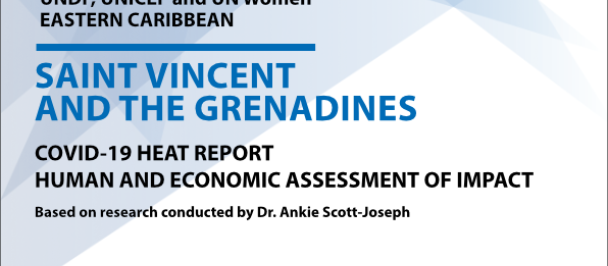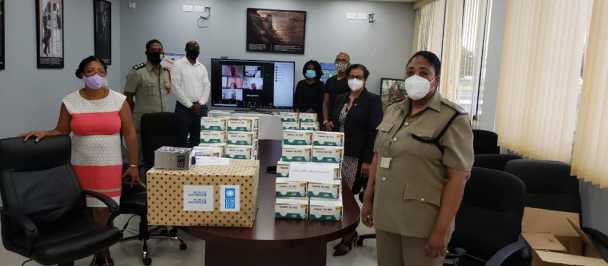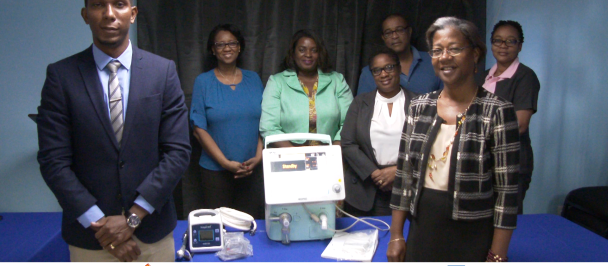The United Nations Development Programme (UNDP) Barbados and the Eastern Caribbean has coordinated a three-phased approach to the relief efforts in St. Vincent and the Grenadines in the wake of the violent volcanic eruptions of the La Soufrière Volcano. Following the eruption on 8 April 2021, it is estimated that 16,000 to 20,000 persons have been affected with approximately 30 villages being evacuated. Ash and volcanic material have already blanketed the entire island which has interrupted most of the economic activity, decimated crops and can have adverse effects on the health of persons exposed.
UNDP has responded with a concerted effort to assist with the immediate emergency situation as well as the potential immediate and long-term recovery needs. The Response Programme which has been elaborated in consultation with national institutions, recovery partners and UNDP team in St. Vincent and the Grenadines will support national institutions and impacted communities quickly recover from the hazard impact by focusing on 3 key pillars:
Pillar 1 - Supporting Household and Building Damage Assessments (HBDA) for data driven and evidence-based decision-making processes.
Pillar 2 - Cleaning volcanic ash, clearing debris and supporting economic reactivation in the most affected areas while providing emergency employment to over 2,000 households directly impacted by the volcano eruption.
Pillar 3 - Restoration and regeneration of forestry, watersheds and protected areas damaged by the eruption.
Marlon Clarke, Head of the Prevention Recovery and Resilience Cluster of UNDP Barbados and the Eastern Caribbean, explained the organization’s plan, “we must align our efforts to assist those persons who are in need now, while still planning for recovery and resilience building in the future; we cannot responsibly do one without the other”, he noted, adding that it was also vitally important in relief and recovery efforts to actively consider gender inequalities and vulnerable populations to ensure that these groups are not further marginalized. “Historically, disasters disproportionately impact women and girls, and as such the response considers the differential needs of men and women, as well as vulnerable communities and addresses equitable distribution of benefits, resources, status and rights.”
Supporting livelihoods through emergency employment will also be important in providing a measure of security for vulnerable affected households as weekly wages earned from clean-up activities can provide short-term financial support to persons who previously lost their jobs due to COVID-19 in addition to being impacted by the volcanic eruption. “The situation in St. Vincent and the Grenadines is further compounded by the effects of the COVID-19 pandemic, over the last year” Ugo Blanco, Deputy Resident Representative of UNDP Barbados and the Eastern Caribbean stated. “In addition to the response strategy, our wider teams are procuring PPE to support those on the front lines of the evacuation efforts. We reaffirm our commitment to St Vincent and the Grenadines as the nation strives to build forward better despite the disaster.”
UNDP will continue to support national institutions and communities under the Conserving Biodiversity and Reducing Land Degradation Using a Ridge-to-Reef Approach project, a GEF-funded initiative that works in partnership with the government to enhance biodiversity and ecosystems conservation through an expanded and strengthened Protected Area (PA) system and with Sustainable Land Management (SLM). Post disaster, the projects will seek to increase the resilience of the country’s biodiversity and protect and preserve valuable ecosystems negatively impacted by the eruptions. At the community level, the UNDP Global Environment Facility - Small Grants Programme (GEF-SGP) will be instrumental in restoring environmental sustainability, alleviating poverty and building the capacity of local NGOs and community-based organizations. Projects related to Conserving Biodiversity using a Ridge to Reef Approach (R2R) and the Integrated Water, Land and Ecosystems Management (IWEco) in partnership with UNEP will be instrumental in the recovery phase.
At this time when exogenous threats like COVID-19 and the current volcanic eruption in St Vincent and the Grenadines are impacting the region, it is vital that developmental efforts are continued to reinforce the need for regional resilience and building forward better. This Response Programme is part of the work of UNDP Barbados and the Eastern Caribbean in its commitment to promoting economic diversification, job creation and resilience with the "Blue Economy for Green Islands" vision. As the Caribbean continues to seek solutions to build resilience and livelihoods for traditionally vulnerable groups, UNDP Barbados and the Eastern Caribbean, in partnership with governments and stakeholders, remains dedicated to the advancement of inclusive and sustainable development throughout the region and building resilient communities that can withstand shocks and crises through targeted projects and programmes.
For media queries contact: Shani Leacock – shani.leacock@undp.org
***
UNDP is the leading United Nations organisation fighting to end the injustice of poverty, inequality and climate change. Working with our broad network of experts and partners in 170 countries, we help nations to build integrated lasting solutions for people and planet. Learn more at www.bb.undp.org or follow at @UNDPBarbados

 Locations
Locations